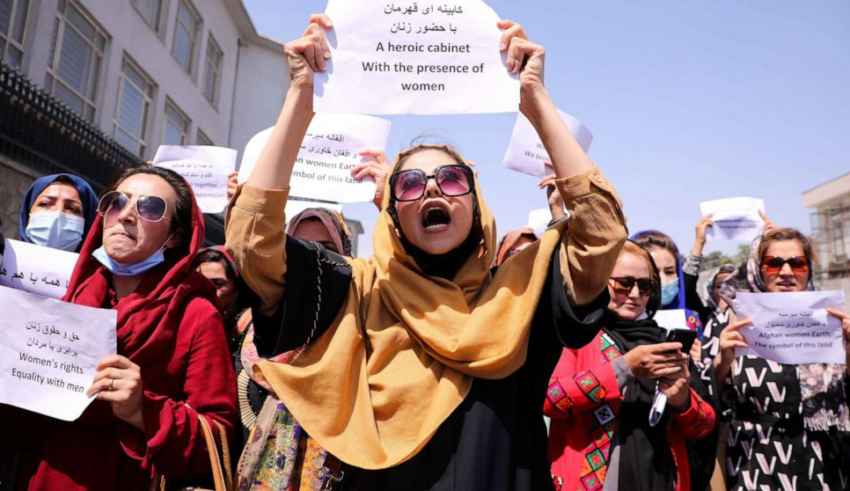
What’s happening in Afghanistan under Taliban rule is being analyzed and looked upon by the entire international arena, it appears that the newly installed government is committing widespread and serious human rights violations against its subjects, but to pay the highest price have been women based on the recent statements from the Human Rights Watch and the San Jose State University (SJSU) Human Rights Institute.
From the moment the Taliban took over, they have installed fear among women and girls, they denied their freedom, starting with the freedom of movement outside their homes, imposing compulsory dress codes, severely curtailing access to employment and education, and at the same time restricting their right to peaceful assembly by firing weapons indiscriminately to disperse the crowd and different kinds of violence, notwithstanding the toll that this situation took on their mental health, to put it in a nutshell, the life of women and girls from Afghanistan has suddenly stopped the moment the Taliban formed the new government.
This whole situation pushed women and girls from all over the country to organize protests in defense of women’s rights, organizers and protesters said they were not engaging in anti-Taliban protests or supporting the former government but were calling for the Taliban to respect their rights to live without fear of reprisal against them and their family members, they want to be able to continue going to their jobs without requiring a male family member as a chaperone, to find a job or for girls above six grade to return to school.
The protests brought to a meeting with a Taliban representative, but the official was inflexible, he encouraged them to stop their claims and told them that they would have been rewarded with full amnesty for their past activities and even with positions in the new government if they openly supported the Taliban.
“Seeing the Taliban is horrifying, my body shakes just seeing them”, “the first days I couldn’t talk, I couldn’t show any emotion” these are some of the testimonies from Afghan women when asked about the Taliban’s history of abusing family members of people the seek to punish.
Another factor that’s keeping women from leaving their homes is the fear of Taliban harassment over their clothing as well as the lack of clarity regarding the Taliban’s rules towards how women should or should not dress.
Day after day this month, Afghan women have taken to the streets in groups large and small to protest against Taliban rule, the regime’s new curbs on their rights, and Pakistan’s influence in Afghanistan. “We want equal rights, we want women in government,” they chanted in Kabul this week but in response, the Taliban have at times have recurred to violence wielding whips, beating women with batons, pointing guns, and firing weapons into the air.
There are no women in the Taliban’s newly named interim cabinet, and the new rulers lost no time in abolishing the country’s Ministry of Women’s Affairs.
The Taliban also tried to prevent journalists from covering the march, organized against the “mysterious murders of young people, particularly the country’s former soldiers”, according to social media invitations for the march, they effectively detained a group of reporters and confiscated equipment from some photographers, deleting images from their cameras before returning them.
The protest comes weeks after multiple reports by the United Nations, Amnesty International, and Human Rights Watch stating that there were credible allegations of more than 100 extrajudicial killings by the Taliban since the takeover.
The government issued new guidelines on the matter during the weekend, banning women from traveling long distances unless escorted by a close male relative.
“Women’s rights are human rights. We must defend our rights,” stated the chair of the Afghan Women’s Network.
In spite of this, Taliban leaders have sought to project a more moderate image in recent months, including saying women and girls will be able to attend school and work in accordance with Islamic law but the possibility to go to school for girls under the Taliban is erratic, and in many provinces, they are not allowed to attend school after grade six, but in more than 10 provinces, schools are open.
In conclusion, it is clear that the Taliban don’t respect at all women’s rights and full or partial gender equality as they should be in accordance with Afghanistan’s obligations under the International Covenant on Civil and Political Rights, the International Covenant on Economic, Social, and cultural rights, the convention on the elimination of all forms of discrimination against women and other human rights treaties to which Afghanistan is a party.
It is now asked of them to:
Clarify that women and girls are free to leave their homes at any time, alone or with others, and dress as they choose, with no need to be accompanied by a male representative;
Appropriately discipline Taliban members and supporters who harass and intimidate women and girls, and establish a meaningful system for women and girls to report abuses;
Reopen government secondary schools and universities to women and girls, and encourage and facilitate the reopening of private educational institutions for girls and women; and finally to permit all women to participate in any form of employment.
References:
Afghan women protest against the killing of former troops, call for rights, available at:
Afghan women are sharing photos of dresses to protest the Taliban’s black hijab mandate, available at:
https://edition.cnn.com/2021/09/13/asia/afghan-women-protest-hijab-mandate-intl/index.html
Women’s protest in Taliban-controlled Kabul turns violent, available at:
https://edition.cnn.com/2021/09/04/asia/afghanistan-saturday-intl/index.html
Afghan Women protest against Taliban restrictions, available at:
https://www.hrw.org/news/2021/09/07/afghan-women-protest-against-taliban-restrictions
https://www.nytimes.com/2021/09/29/style/donottouchmyclothes-afghan-women-protest-taliban.html
Photos: Afghan Women are protesting for their rights, available at:
https://www.npr.org/2021/09/09/1035214735/women-afghanistan-protest-taliban
By The European Institute for International Law and International Relations.














